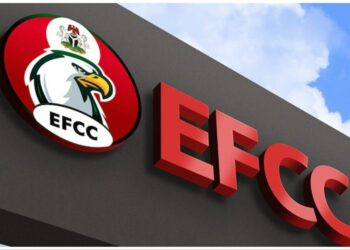 The Federal High Court on Monday set aside an interim order for the forfeiture of the properties of Peter Nwaoboshi to the Nigerian government.
The Federal High Court on Monday set aside an interim order for the forfeiture of the properties of Peter Nwaoboshi to the Nigerian government.
The judge, Taiwo Taiwo, in his ruling on Monday overruled the earlier order by the same court because “due process of law” had not been followed.
The court had made an initial order for the confiscation of 14 properties and 22 bank accounts linked to Mr Nwaoboshi.
The bank accounts were with Zenith Bank, UBA, Access Bank and Sterling Bank, and they were all joined in the suit.
Following the court order, the Special Presidential Investigation Panel on the Recovery of Public Property (SPIP) took temporary possession of several properties allegedly owned by the senator.
The presidential panel, whose head, Okoi Obono-Obla, is currently enmeshed in certificate forgery and corruption allegations, on July 14, took possession of Mr Nwaoboshi’s asset and bank accounts.
PREMIUM TIMES had reported how the presidency gave a directive that Mr Obono-Obla should be relieved of his appointments “immediately” following the allegations.
The newspaper also reported that the presidency further directed that the embattled SPIP chairman be investigated by the ICPC.
But the judge in his ruling on Monday said, “The function of the SPIP is supposed to have been stated in section one of the Act, it is stated in section 4, that after investigations, the SPIP shall report it’s findings to the aide of the federal government.
“The court held that exparte order in that case just like, in this case, do not fall within the functions of the SPIP.
“The SPIP is to issue a notice to declare asset, there is nothing before the court that it was done.
“The Court of Appeal as in this case stated that the SPIP cannot rely on on the EFCC ACT to obtain interim order for forfeiture of properties.
“Section 8 of the Act states that an interim attachment order is only granted by this court in a pending trial where the prima facia case has been made out against the person.
In this case, as stated earlier there is no pending trial where a prima facia case has been made out against the first respondent.
“With all due respect to the learned senior counsel of the applicant/respondent, the fact that he filed in the name of the attorney general of the federation does not derogate from the fact that due process must be followed by the office of the SPIP where the processes.”
The judge cited Section 44(1) of the 1999 constitution as amended which reads thus that “No moveable property or any interest in an immovable property shall be taken possession of compulsorily and no right over or interest in any such property shall be acquired compulsorily in any part of Nigeria except in the manner and for the purposes prescribed by a law that, among other things;
(a) requires the prompt payment of compensation therefore and
(b) gives to any person claiming such compensation a right of access for the determination of his interest in the property and the amount of compensation to a court of law or tribunal or body having jurisdiction in that part of Nigeria.
Mr Taiwo said SPIP is not the EFCC, who has such law and it cannot act like one.
“Due process must be followed and I, therefore, hold that due process has not been followed in this matter. However, since this court has no jurisdiction to make the interim order, the only one I can make and which I made now is to set aside the orders made by this court on the 2nd day of July 2019.
“The orders are hereby set aside and discharged,” the judge ruled.









